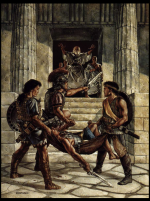Dungeonosophy
Legend
My timeframe was identical to yours (re: BECMI, quick uncomfortable dip into 1E, then long run with 2E)A friend of mine asked, rather out of the blue, what edition of D&D I would use for my "last D&D campaign ever" and I answered, without hesitation, 2nd Edition AD&D. I kind of want to examine that a little bit, and thought here would eb a good place.
1. For sure there is a lot of nostalgia involved. While I was a "BECMI kid" -- we started with B and kept going knowing with nothing else for years -- it wasn't until I discovered 2nd Edition that the whole D&D thing blossomed for me. We played a tiny bit of 1E but discovered it so late that 2E was out within 6 months. Suddenly all the impenetrable esoterica of 1E was gone and the game made sense. Moreover, we could use the truly awesome bits of BECMI without any trouble at all, particularly the Domain rules and the War Machine.
2. 2E is so broadly written that it covers almost any subgenre of fantasy you can think of. You can still 1E dungeon crawl with it, but you can also Lord of the Rings with it and Game of Throne with it.
3. THAC0 is not hard. It's subtraction. Stop it.
4. This goes back to 1 above a bit, but my longest running campaign (20 years) started with 2E and even though it went through 3E and 3.5 and even Mutants and Masterminds (when the campaign world advanced to the super hero age) it still had its heart in 2E.
5. I feel like I could bolt any system from any D&D edition or any other game onto 2E and never worry about "balance." I could add advantage/disadvantage and it would work fine. I could include item creation from 3.x. I could, as mentioned, implement the BECMI domain management and mass combat rules. People sing the praises of a integrated core mechanic, but I thing a solid game with disparate systems lends itself to infinite hacking, which is a core tenet of D&D.
6. That Monster Manual is a thing of beauty.
7. There was SO MUCH STUFF for it. I know that wasn't good for TSR, but it was freaking great for my table and campaigns.
Anyway, I just felt like articulating the things I love about 2E. Carry on.
I quite like 2.5E point-buy Skills & Powers (including errata).








